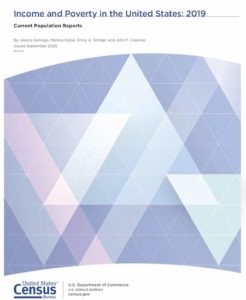 The U.S. Census Bureau has released its annual report on income in the United States. According to data in the report, the median income of Black households in the United States in 2019 was $45,438. This is up from $42,110 in 2018. The median income figure shows the point where half of all families earn below this level and half earn above this level.
The U.S. Census Bureau has released its annual report on income in the United States. According to data in the report, the median income of Black households in the United States in 2019 was $45,438. This is up from $42,110 in 2018. The median income figure shows the point where half of all families earn below this level and half earn above this level.
For non-Hispanic White households in 2019, the median income figure was $76,057, up from $71,992 in 2018. So while income levels increased for both Black and White households, the increase was more for Whites than for Blacks. Thus, the racial income gap widened. In 2019, the median Black household income was 59.7 percent of the median income of non-Hispanic White families. With only minor fluctuations, the racial gap in median income has remained virtually unchanged for more than a half-century.
It is also important to look at the racial gap in income at the highest levels. These families are ones that can afford to send their children to the college of their choice without having to worry about financial aid or student loans. Some 11.8 percent of non-Hispanic White households in 2019 had incomes above $200,000. For Black households, 4.6 percent had incomes of more than $200,000. Thus, Whites are far more likely than Blacks to come from high-income households.











You contradict yourself which makes your work obsolete and subjective and opinionated instead of fact-based. Here is an article published by JBHE.com before this one published. Try looking at updated census information. Why is everything always against whites. Whites will be the minority population soon. Who will you blame then? Still non-Hispanic whites for EVERYONE’s problems. It’ is just sad… that’s all
https://jbhe.com/news_views/47_four-year_collegedegrees.html
I completely agree. I have experienced far more black “gatekeepers” in promotional opportunities in my career than with non Hispanic whites. It is no longer white folk holding back black women and men back in the attainment of the American dream, it is people that look like them.
The above article elucidates the persistence of earnings gap between the Black-White households in total. The article that you share in comparison, focuses on the progress of Blacks in comparison with their degree holding counterparts who are White…which is stated in the article. “Therefore, one must always keep in mind that the encouraging economic figures we report here apply to only one in every nine African Americans.” as quoted. Not sure how you missed that. Additionally, there are more than enough examples of Whites being the minority group, yet maintain control of all economic resources of native and indigenous people.